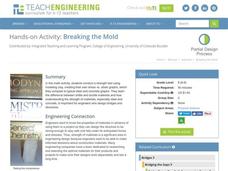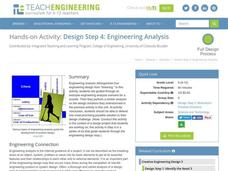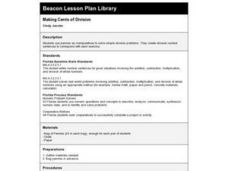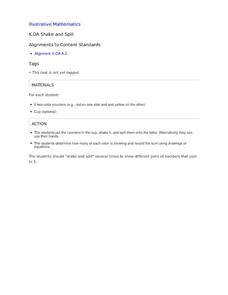Tennessee Valley Authority
Renewable Energy Sources
Not all energy sources are renewable, as learners investigate in this unit. Made up of six lessons that span a few weeks of instruction, the unit has learners examining US energy reserves and consumption, using data to draw conclusions...
Tell City Schools
The Cay
Support your instruction of The Cay by Theodore Taylor with this extensive unit of materials. Provided here are prereading activities, worksheets and discussion questions for the entire book, and reading quizzes that you can use to check...
Teach Engineering
Breaking the Mold
A little too much strain could cause a lot of stress. Groups conduct a strength test on clay. Using books as weights, pupils measure the compression of clay columns and calculate the associated strain and stress. Teams record their data...
Rochester Institute of Technology
Laparoscopic Surgery
Nobody is as smart as all of us together. In a collaborative learning activity, scholars learn it takes a team to be successful in laparoscopic surgeries. Groups complete the laparoscopic task as a team and discuss their results to...
Teach Engineering
Design Step 4: Engineering Analysis
What is the main difference between an engineer and a technician? This is one of the driving questions in a plan that proves that analysis at every step of development is crucial to the engineering design process. The lesson starts with...
Anti-Defamation League
The Hate U Give
The Hate U Give by Angie Thomas became a quick hit in the young adult literature genre before its adaptation in the 2018 film of the same name. Use a thorough lesson, discussion guide, and series of activities to discuss the social...
Laboratory for Atmospheric and Space Physics
A Classroom Solar System
Create a scaled model of our solar system in your classroom! Scholars work collaboratively to build paper mache planets and hang them in their proper position to showcase each planet's location in the solar system.
EngageNY
Differences Due to Random Assignment Alone
It takes a lot of planning to achieve a random result! Learners compare results of random assignment, and conclude that random assignment allows results to be attributed to chance. They also realize the set of random means are clustered...
Curated OER
Toilet Plunger Sundial
Students build a sundial to measure the local noon time. In this third grade science lesson, students build a sundial out of common materials and align to measure the local noon. This lesson is a hands-on tracking of the sun, and allows...
Curated OER
Making Cents of Division
Third graders use pennies as manipulatives to solve simple division problems. They create division number sentences to correspond with each exercise. This is a good, hands-on way to teach the concept of division.
Curated OER
Big, Bad, "B" and "D"
Students practice discerning between the letters D and B. Through hands on and listening activities, they recognize the difference between the commonly confused letters B and D. They practice writing both letters and correcting common...
Curated OER
Baseball Activity: Bouncing Balls
Students explore the concept of motion. In this hands-on physics lesson, students examine how the construction of baseballs and the temperature they are stored at affect their bounce.
Curated OER
What Is The Matter?
Students engage in a lesson plan about the scientific concept of matter. They use essential questions in order to guide the research process. Students engage in several class inquiries that are hands on in order to investigate the...
Curated OER
On the Other Hand
Students identify traits that are either genetic or developmental in nature and determine why it might be difficult to learn if handedness is genetic or developmental. They explore theories on the causes of left-handedness by reading and...
Curated OER
Got the Whole World in My Hands
Students review factors that threaten survival of different species. this lesson is part of a multi-segmented unit on animal survival.
Curated OER
Modeling Basic Operations
Eighth graders engage in a instructional activity that investigates basic mathematical operations using a number line. They use props for hands on activities of visualizing the solution to a particular problem.
Curated OER
Compare And Contrast-- People of Eminence
In this social studies worksheet, learners are directed to a Web site to read about famous people. Students choose 2 people and use a Venn diagram to compare and contrast. Learners then investigate the difference between being "famous"...
Curated OER
Telling Time to the Hour
Here is a very good presentation on telling time using analog clocks. Youngsters are coached on how to tell time to the top of the hour by being taught about the difference between the hour hand and the minute hand. Some clear...
Read Works
How to Say “I Ruff You”
Who says you need a human to be your valentine on Valentine's Day? Give your dog-loving readers an inspiring perspective on how a sister givdes her brother a valentine from the family dog. They then answer 10 questions thatd involve...
Curated OER
Grammar Worksheet: Lie vs. Lay
To do something to someone or something or not to do something to someone. That is the question. And it is the source of the confusion between lie and lay. The strength of this worksheet is in the clear, cogent explanation for the...
Illustrative Mathematics
Buttons: Statistical Questions
Here is a nice activity about recognizing the difference between a statistical question and answer and one that anticipates a fixed answer. From this, your future statisticians will develop an understanding of variability and be able to...
Curated OER
Errors vs. Rhetorical Devices
Is there a difference between writing errors and employing rhetorical devices? This presentation argues that there is a difference, but it might be a finer point than one would think. Addressing double entendre, oxymorons, and parody,...
Curated OER
Who is the Expert? Exploring Credible Sources in Healthcare
How do you decide what sources are credible when researching online? Evaluate sources with a focus on researching health issues. After brainstorming common health concerns and how they would try to diagnose these problems, class members...
Illustrative Mathematics
Shake and Spill
Entertaining as well as educational, this math activity about decomposing numbers is bound to capture the engagement of young learners. Given a cup and five two-color counters, young mathematicians simply shake and spill the cup,...

























